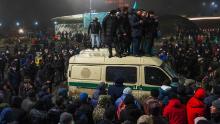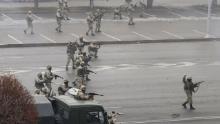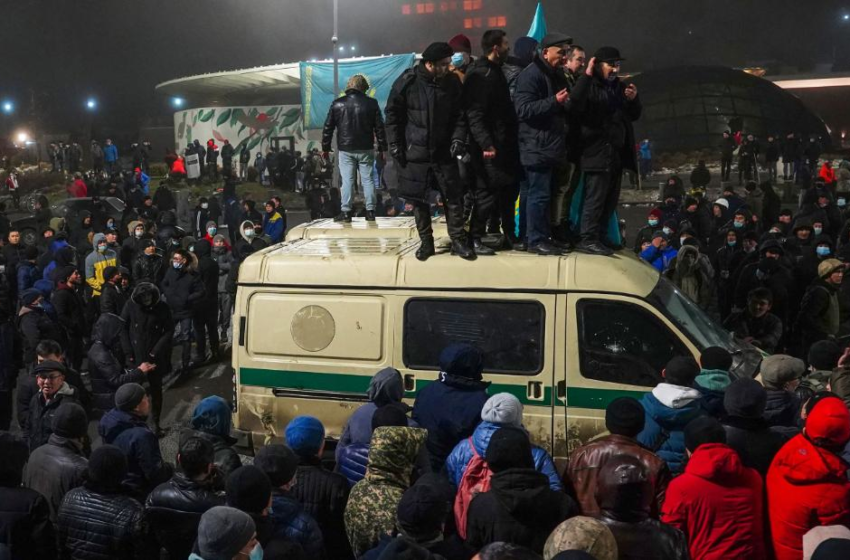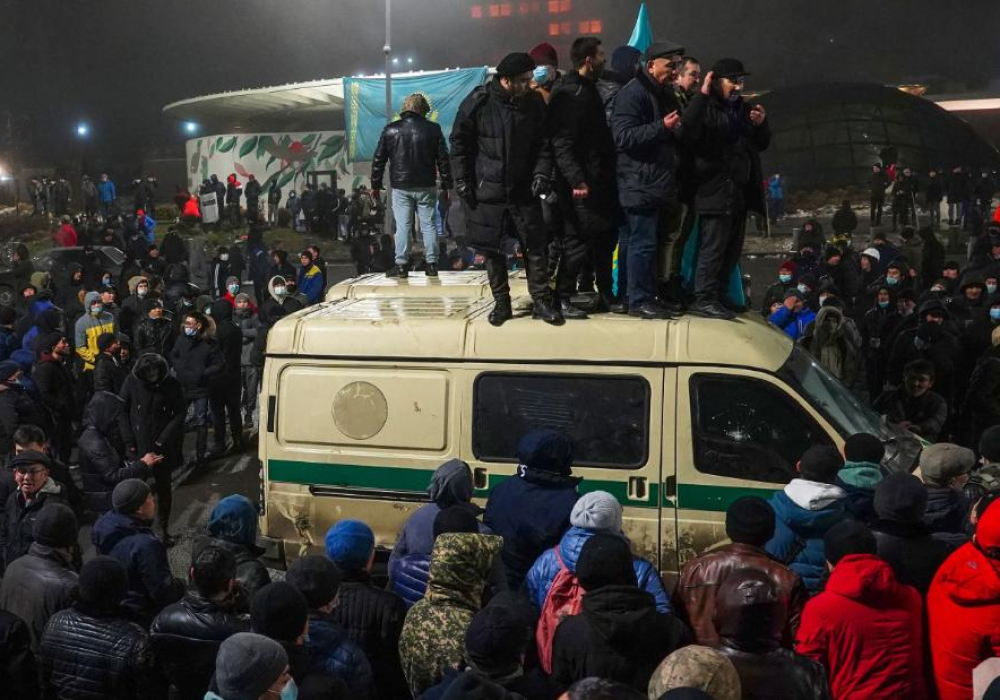At least 13 law enforcement officials died in Almaty and 353 people were injured, state-run Khabar 24 TV reported.
More than 1,000 people in different regions were injured as a result of the turmoil. Of these, almost 400 were hospitalized, with 62 people in intensive care, the Ministry of Health said, according to Khabar 24.
The violence continued on Thursday with security forces reportedly firing on protesters and explosions being heard close to Republic Square in Almaty, Russian state news agency TASS reported.
The military demanded over loudspeakers that people should leave the square and warned they would open fire, TASS reported.
“Those who are running away from the square say that [the security forces] fired shots at the rioters, and saw how some of them were definitely falling,” a source told TASS.
State news agency Sputnik Kazakhstan reported that groups of five to six people, some of whom were injured, were seen running from the the scene.
The demonstrations are the biggest challenge yet to autocratic President Kassym-Jomart Tokayev’s rule, with initial public anger over a rise in fuel prices expanding to wider discontent with the government over corruption, living standards, poverty and unemployment in the oil-rich, former Soviet nation, according to human rights organizations.
Agence France-Presse and Reuters, which have correspondents on the ground, reported fresh gunfire in Almaty. Gunshots and screaming were heard in footage of the overnight clashes in Almaty.
Almaty police department representative Saltanat Azirbek told state-run Khabar 24 that “dozens of attackers were liquidated” during overnight attempts to storm buildings in the city.
Azirbek urged people to stay at home as an “anti-terrorist operation” was carried out.
The city police department told Khabar 24 that weapons had been stolen from a gun store overnight. Khabar 24 reported the bodies of two officers were found beheaded, citing the commandant’s office of Almaty.


CSTO in Kazakhstan
This comes after President Tokayev appealed for the help of the Collective Security Treaty Organization (CSTO) — which includes Russia, Belarus, Armenia, Kazakhstan, Kyrgyzstan and Tajikistan — on Wednesday following days of protests across the country over spiking fuel prices.
Protests were ignited when the government lifted price controls on liquefied petroleum gas (LPG) at the start of the year, but have now widened into a show of anger at the governance of the country.
At a demonstration in Almaty on Wednesday evening, a protester reiterated these concerns.”The government is rich. But all of these people here [gesturing to crowd] will have to pay the loans to the bank tomorrow,” he told CNN.
“We’re not just standing here … under difficult circumstances for nothing. We’re standing because we have something to say. We have our own pain that we want to share — and it’s not going to be pure statistics from official sources — it’s going to be people’s pain,” he added.




The CSTO said Thursday its “peacekeeping contingent” had begun to fulfil its tasks in the country, adding that Russian forces were being transferred to Kazakhstan by military aircraft.
“The main tasks of the Collective Peacekeeping Forces of the CSTO will be the protection of important government and military facilities, assistance to the forces of law and order of the Republic of Kazakhstan in stabilizing the situation and returning it to the legal field,” the statement read.
Russia maintains close relations with the Central Asian nation and uses Baikonur Cosmodrome in the south of the country as the launch base for its crewed space missions. Kazakhstan also has a significant ethnic Russian minority; the CIA World Factbook says that in 2019 around 20% of its 19 million population was ethnically Russian.
The Russian foreign ministry said Thursday it considered the situation as a foreign-inspired attempt to undermine the state’s security and integrity.
If necessary, it could take steps that would aim “to facilitate the conduct of the counter-terrorist operation by the law enforcement agencies of Kazakhstan,” the ministry said in a statement published Thursday.
The United States and the European Union have condemned the violence, appealing for restraint from all parties.
The EU’s foreign policy chief, Josep Borrell, said military assistance to Kazakhstan “brings back memories of situations to be avoided,” in a tweet on Thursday. “Rights and security of civilians must be guaranteed,” he added. “EU is ready to support in addressing this crisis.”
US State Department Spokesperson Ned Price said Thursday that “the US and frankly the world will be watching for any violations of human rights.”
“We have questions about (the CSTO) deployment, precisely because Kazakhstan, the government of Kazakhstan has resources, has its own resources, and is a government that is, and has been well-fortified,” Price said.
The UN High Commissioner for Human Rights Michelle Bachelet joined calls for a peaceful solution, saying in a statement: “International law is clear: people have the right to peaceful protest and freedom of expression. At the same time, protesters, no matter how angry or aggrieved they may be, should not resort to violence against others.”
Ongoing violence
Almaty authorities warned that people can be “shot without warnings” in light of ongoing violence, a journalist in Almaty told CNN on Thursday.
The mayor’s office, the prosecutor’s office and the presidential building were attacked overnight, the journalist said. The presidential building was set on fire and there were fears the fire could spread, they added.
The city’s streets appear “scary quiet” Thursday morning but many shops are closed, the journalist said.
Internet and telecommunications were up for a brief time on Thursday after a nationwide blackout since Wednesday, the journalist added.
Kazakhstan’s national airline, Air Astana, has canceled all flights until at least Friday due to internet disruptions, Khabar 24 reported on Thursday. An airline spokesman said the internet is essential for “conducting engineering checks and recordings while preparing aircraft for flight.” The airline aims to resume flights as soon as the situation stabilizes, and internet connection is restored, state media reported.
Kazakhstan, the world’s ninth-largest nation by landmass, has attracted foreign investment and maintained a strong economy since its independence in 1991, but its autocratic method of governance has prompted international concern and has seen authorities harshly crack down on protests, according to global rights groups.
The demonstrations were ignited in the oil-rich western Mangystau region, when the government lifted price controls on liquefied petroleum gas (LPG) at the start of the year.
By January 5, protesters reportedly stormed Almaty’s airport, forcibly entered government buildings, and set fire to the city’s main administration office, according to local media. There were also reports of deadly clashes with police and military, and buildings damaged in major cities.
Much of the protesters’ anger has been directed toward Kazakhstan’s leadership, which tightly controls the country.
In an effort to curb the unrest, Tokayev has attempted to make concessions including an order to reduce the price of LPG to 50 tenge ($0.11) per liter “to ensure stability in the country.” But they have failed to curtail the protests and Tokayev on Wednesday vowed to act “as tough as possible” to stop the unrest.
Earlier that day, authorities declared a nationwide state of emergency with a curfew and movement restrictions until January 19, local media reported.
CNN’s Rob Picheta, Helen Regan, Radina Gigova, Ivan Watson and Vasco Cotovio contributed to this report.














